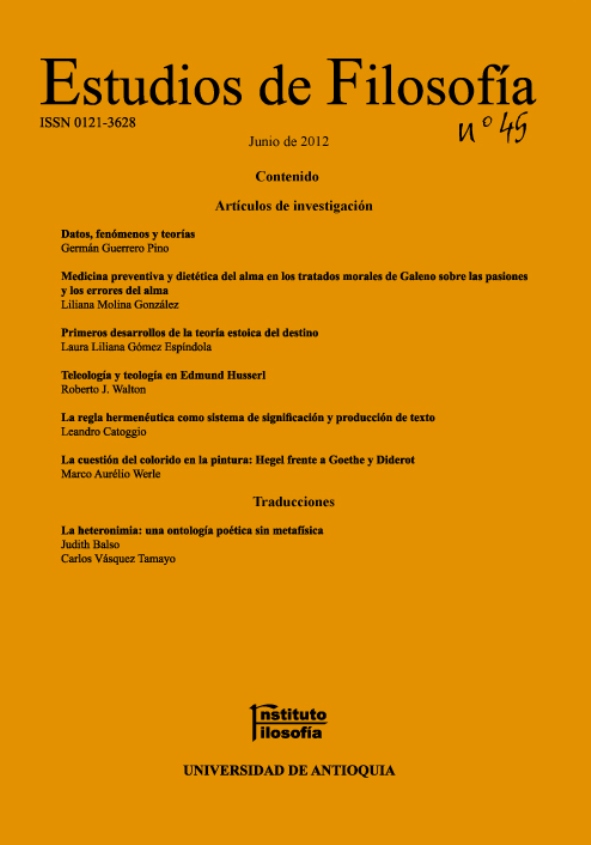Heteronomy: poetic onthology without metaphysics
DOI:
https://doi.org/10.17533/udea.ef.14560Keywords:
Heteronomy, onthology, truth, writting, being, nothingness, language, literature, philosophy.Abstract
Judith Balso develops in this piece an organic view of Fernando Pessoa’s Heteronomy. With it she aspires to show how Poetry faces, with its own recourses, the challenges and questions that belong to the realm of Ontology. So Pessoa is placed beyond the traditional separation between Philosophy and Poetry that pertains to Western Metaphysics. When one reads Pessoa one has to incarnate the creative writing of the poet to face the essential questions of being human: Existence, the question on Being and Nothingness, the relationship of Man with Nature, the Question on Language and through Language, the relationship of one Human Being with other Human Beings. So in his field are integrated a diversity of preocupations that range from Gnoseology to Aestetics, from Ethics to Literature, from the Thought on God to The Gods. Balso’s idea is that the crisis proper to Metaphysics finds in Pessoa not only and echo but even possible alternatives for renovation. Her essay invites one to establish a propositive relation lacking the prejudices of an opposition between Poetry and Philosophy.
Downloads
Downloads
Published
How to Cite
Issue
Section
Categories
License
Copyright (c) 2012 Judith Balso, Carlos Vásquez T.

This work is licensed under a Creative Commons Attribution-NonCommercial-ShareAlike 4.0 International License.
Authors who publish with this journal agree to the following terms:
1. The Author retains copyright in the Work, where the term "Work" shall include all digital objects that may result in subsequent electronic publication or distribution.
2. Upon acceptance of the Work, the author shall grant to the Publisher the right of first publication of the Work.
3. The Author shall grant to the Publisher a nonexclusive perpetual right and license to publish, archive, and make accessible the Work in whole or in part in all forms of media now or hereafter known under a Creative Commons Attribution-NoCommercia-ShareAlike (CC BY-NC-SA 4.0), or its equivalent, which, for the avoidance of doubt, allows others to copy, distribute, and transmit the Work under the following conditions: (a) Attribution: Other users must attribute the Work in the manner specified by the author as indicated on the journal Web site;(b) Noncommercial: Other users (including Publisher) may not use this Work for commercial purposes;
4. The Author is able to enter into separate, additional contractual arrangements for the nonexclusive distribution of the journal's published version of the Work (e.g., post it to an institutional repository or publish it in a book), as long as there is provided in the document an acknowledgement of its initial publication in this journal;
5. Authors are permitted, and Estudios de Filosofía promotes, to post online the preprint manuscript of the Work in institutional repositories or on their Websites prior to and during the submission process, as it can lead to productive exchanges, as well as earlier and greater citation of published work (see The Effect of Open Access). Any such posting made before acceptance and publication of the Work is expected be updated upon publication to include a reference to the Estudios de Filosofía's assigned URL to the Article and its final published version in Estudios de Filosofía.















